Related Research Articles

Kelly Macdonald is a Scottish actress. Known for her performances on film and television, she has received various accolades including a BAFTA Award, a Primetime Emmy Award, and four Screen Actors Guild Awards.

Ian Grant Macdonald was a British mathematician known for his contributions to symmetric functions, special functions, Lie algebra theory and other aspects of algebra, algebraic combinatorics, and combinatorics.
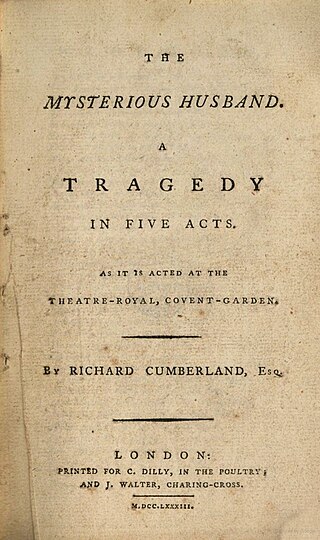
The Mysterious Husband is a play by the British writer Richard Cumberland. It is a Domestic drama with a tragic ending, first performed in 1783. Along with several other Cumberland plays it was influenced by the 1768 gothic play The Mysterious Mother by Horace Walpole.

Marion Florence Nicoll was a Canadian painter. She is known as one of the first abstract painters in Alberta. In 1933 she became the first woman instructor at the Provincial Institute of Technology and Art. In 1977 Nicoll became the first woman artist in the Prairies to become a member of the Royal Canadian Academy of Arts.
The Man of Taste is a 1735 comedy play by the British writer James Miller. It was a success and was performed numerous times during the theatre season. It is also known by the longer title The Man Of Taste or, The Guardians.

The School for Widows is a 1789 comedy play by the British writer Richard Cumberland. It premiered at the Theatre Royal, Covent Garden on 8 May 1789. The original Covent Garden cast included William Thomas Lewis as Jack Marmoset, Thomas Ryder as Mr Wordly, John Quick as Sir Wilful Wayward, Alexander Pope as Frederick, Isabella Mattocks as Mrs Wordly, Sarah Wewitzer as Mrs Gayless and Frances Abington as Lady Charlotte Richmore. It was never published.

More Ways Than One is a 1783 comedy play by the British writer Hannah Cowley.
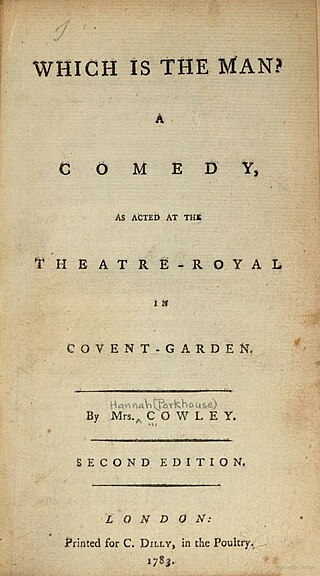
Which is the Man? is a 1782 comedy play by the British writer Hannah Cowley. The original Covent Garden cast included John Henderson as Fitzherbert, William Thomas Lewis as Beauchamp, Richard Wroughton as Belville, John Quick as Pendragon, Charles Lee Lewes as Lord Sparkle, Isabella Mattocks as Sophy Pendragon, Sarah Maria Wilson as Kitty, Mary Morton as Clarinda, Harriet Pitt as Tiffany, Elizabeth Satchell as Julia and Elizabeth Younge as Bloomer.
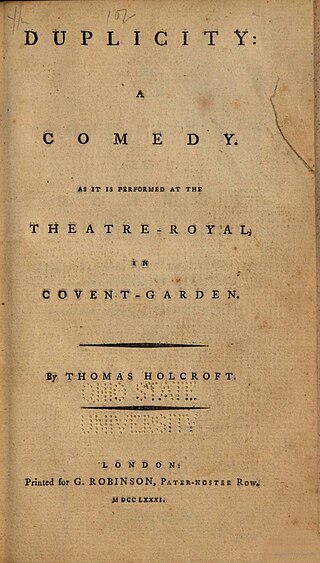
Duplicity is a 1781 comedy play by the British writer Thomas Holcroft.
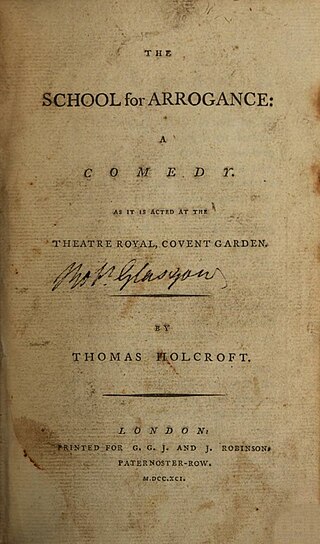
The School for Arrogance is a 1791 comedy play by the British writer Thomas Holcroft.

The Way to Get Married is a 1796 comedy play by the British writer Thomas Morton. The play was frequently revived well into the nineteenth century.

The Road to Ruin is a 1792 comedy play by the British writer Thomas Holcroft.

A Bold Stroke for a Husband is a 1783 comedy play by the British writer Hannah Cowley. The title is a variation on Susanna Centlivre's A Bold Stroke for a Wife. The original Covent Garden cast included William Thomas Lewis as Don Julio, Richard Wroughton as Don Carlos, John Quick as Don Caesar, John Edwin as Don Vincentio, Richard Wilson as Gasper, John Whitfield as Don Garcia, James Fearon as Vasquez, Mary Robinson as Victoria, Sarah Maria Wilson as Minette, Mary Whitfield as Laura, Harriet Pitt as Sancha and Isabella Mattocks as Olivia. The epilogue was written by John O'Keeffe. The play is in five acts and is set in Madrid.
The World as It Goes is a 1781 comedy play by the British writer Hannah Cowley.
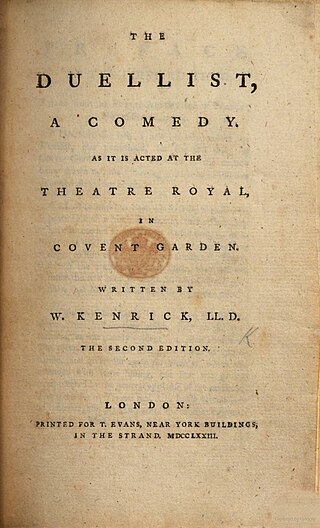
The Duellist is a 1773 comedy play by the British writer William Kenrick. It premiered at the Theatre Royal, Covent Garden on 20 November 1773. The original Covent Garden cast included Henry Woodward as General Gantlet, William 'Gentleman' Smith as Captain Boothby, Edward Shuter as Sir Solomon Bauble, John Quick as Serjant Nonplus, William Thomas Lewis as Counsellor Witmore, Richard Wroughton as Lord Lovemore, John Cushing as Mactotum and Jane Green as Lady Bauble.
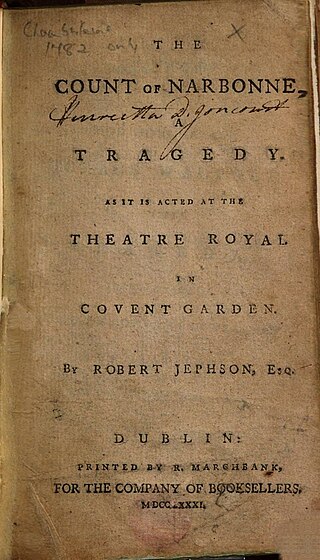
The Count of Narbonne is a 1781 tragedy by the Irish writer Robert Jephson. It was inspired by Horace Walpole's novel The Castle of Otranto.
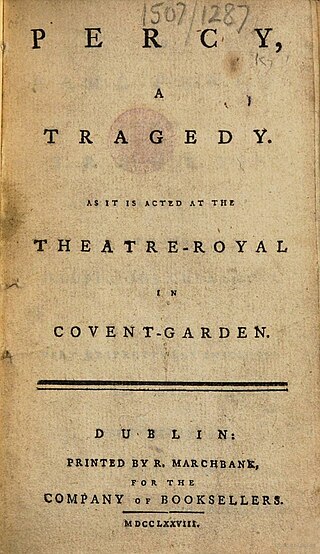
Percy is a 1777 tragedy by the British writer Hannah More. It was inspired by the French play Gabrielle de Vergy by Pierre-Laurent Buirette de Belloy. The play premiered at the Covent Garden Theatre in London. The original cast included William Thomas Lewis as Percy, Francis Aickin as Earl Raby, Thomas Hull as Sir Hubert, John Whitfield as Edric, Thomas Robson as Harcourt, James Thompson as Servant, Richard Wroughton as Earl Douglas and Ann Street Barry as Elwina. David Garrick wrote both the prologue and epilogue.
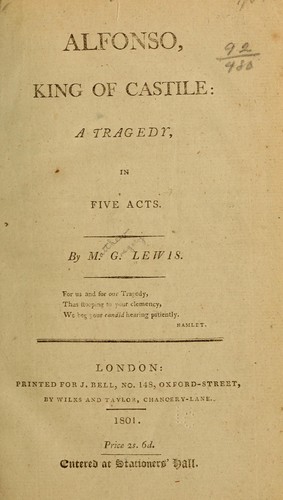
Alfonso, King of Castile is a historical tragedy by the English writer Matthew Lewis. It was published in November 1801, and was first staged at the Theatre Royal, Covent Garden the following year. It is set during the reign of Alfonso XI of Castile during the fourteenth century.

William Barrymore was a British stage actor. Originally from Taunton he was part of a company of strolling players in the West Country, and was acting at Plymouth in 1780. He first appeared at the Theatre Royal, Drury Lane in 1782, under the management of Richard Sheridan, and became a long-standing member of the company. He is also the namesake of the famed Barrymore family.

Fashionable Levities is a 1785 comedy play by the Irish writer Leonard MacNally. It premiered at the Theatre Royal, Covent Garden in London on 7 April 1785. The original cast included William Thomas Lewis as Welford, John Quick as Sir Buzzard Savage, Richard Wroughton as Captain Douglas, Ralph Wewitzer as Colonel Staff, John Edwin as Nicholas, John Henderson as Mr Ordeal, Margaret Martyr as Clara, Sarah Maria Wilson as Grace and Mrs Webb as Honour. MacNally dedicated the play to the Anglo-Irish aristocrat the Countess of Salisbury. The Dublin premiere took place at the Crow Street Theatre on 5 April 1786.